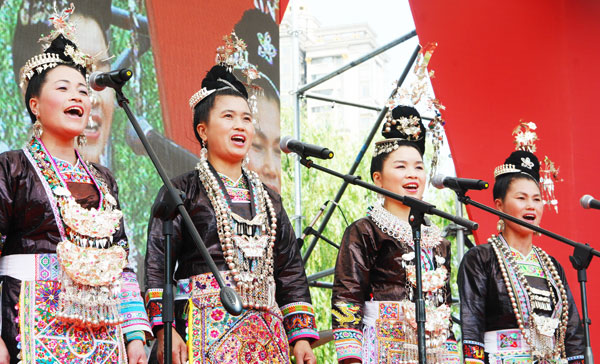|
During the rush hour of a recent afternoon in the busy Xujiahui area of Shanghai, passengers stopped by an outdoor stage to listen to the performance of exotic Indian music. Many were surprised to learn that the performer was Bombay Jayashri, singer of Pi's Lullaby from the film Life of Pi.
 |
|
Dong ethnic singers from Liping, Guizhou province, perform Grand Songs at World Music Shanghai. Ben Chi / for China Daily
|
"The story of Life of Pi seems so far away, but now I can see the performance of Jayashri just outside my office building. It's great," says Xu Yan, a young woman in the audience.
Jayashri gave another performance in Shanghai at the square of Jinqiao International Plaza.
Because of the popularity of Life of Pi in China, she was the headliner of 2013 World Music Shanghai and attracted a large number of people.
"I had been worried if Chinese audiences will enjoy Indian classical music, but I am glad to see that they really like it," Jayashri says.
This year's World Music Shanghai was held from April 29 to May 5 at seven venues across the city and presented 11 acts. They came from China, Russia, Georgia, Bulgaria, United States, India, Reunion Island, France and Mauritius.
Traditional Tuvan folk songs by Huun Huur Tu, American old-time music by Toubab Krewe, a cappella by Bulgaria's Eva Female Vocal Quartet, Grand Songs of China's Dong ethnic group, and a collaboration between rocker Song Yuzhe and Uygur folk musician Ubulhasan Mamat were among the lineup.
The musicians not only performed at the festival individually, but also jammed together.
"Although I cannot understand the lyrics of the Chinese musicians, I enjoy their performance very much," says H. N. Bhaskar, Jayashri's violinist. "I hope they will come to India to perform, and we will learn from them."
At a festival party, musicians from different countries played together and created a musical language that has never been heard before.
"We were listening to each other and trying to catch each other's ideas," says Song, who played guitar and banjo in the jam session.
"I hope this kind of exchange will continue. It is even more important than music itself."
Chinese musicians from different regions also played together at the festival.
Four years ago, Song traveled to Northwest China's Xinjiang Uygur autonomous region and met folk musician Ubulhasan. Song was inspired by the traditional Uygur music of Ubulhasan and decided to work with him in his new project.
In the show titled A Magic Musical Encounter at the festival, Song and Ubulhasan blended their music and lyrics, and the result was refreshing. Their performance also appealed to different audiences.
"The best thing about World Music Shanghai is that we provide a platform for different musical cultures from around the world to meet," says Yang Lei, director of the festival.
"I hope Chinese music will become a more and more important part of world music through our festival."
World Music Shanghai started in 2008 as part of Shanghai's events to welcome the World Expo 2010. During the World Expo, the World Music Shanghai went on for 184 days - the entire duration of the World Expo - showcasing music from all over the world, as well as from various regions of China.
After the World Expo, the festival continued to be held, and last year it was broken into the spring and autumn editions. This year, the autumn edition will be held in October.
The performances of this year's World Music Shanghai were held in both downtown areas and some suburb towns, like Sanlin in the Pudong New Area. All the shows were free of charge.
"I hope the festival will attract more people to appreciate world music, so that world music will have a bigger market in China," Yang says.
|